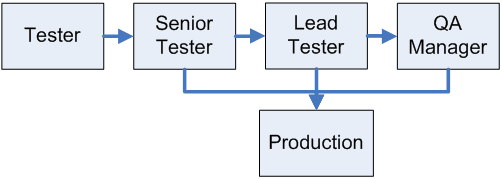
Game Tester
What is a Game Tester?
TweetBy Richard Robledo
You find yourself playing three hours into a quest on your favorite console RPG. The Ancient Dragon that has killed you numerous times is finally down to its final 5% of health, thanks to your faithful Lightning Sword of…Faith, and you know you’ll get the plate armor you’ve been longing to collect. Plus, the XP earned from defeating the dragon will level up your character. Even better yet, completing this quest opens up a whole new set of quests on a different part of the map that, up until now, you’ve been unable to venture into.
In desperation, the injured dragon spews forth a stream of fire, but you successfully deflect it with your golden shield. Bravely, you charge the dragon while equipping your dwarven great sword, and let loose a powerful overhand slice into the dragon’s neck. Suddenly, the action halts, as if the game is taking a screenshot of your victorious moment. You wait several seconds for the game to resume…but it never does. You’re only course of action is to reboot the console and begin the quest all over again. What you’ve just discovered is a bug, a “hard lock,” and every video game ever made is infected with these bugs. The only way to repel this software infestation is to employ a team of individuals who will dedicate thousands of hours to finding and reporting the locations of these “glitches.” Although some bugs sneak by, your video games would be a whole lot more frustrating to play were it not for the hard work of the Quality Assurance Tester also known as the Video Game Tester.
Who’s the Game Tester?
The Game Tester is the person in the game industry that plays one or more games over and over and over again for months. One misconception from industry outsiders is that a tester shows up to work and plays Skyrim for an hour, then moves onto Starcraft II for a few hours, and then plays Angry Birds Space for the rest of the afternoon. They’ll often ask, “All you do is play a stack of games all day, right?” Not right. A tester might play the same Nintendo 3DS game for 6 months straight. Throw in crunch time, and those 6 months now includes a six or seven day work week, 12+ hours a day, on the same game! So you’re probably wondering what they do with all that time sitting in the QA department.
A game tester’s primary objective is to play a game and find where that game fails to perform or be presented as intended by the game developers. All areas of a video game – design, art, animation, audio, or programming – are susceptible to bugs. These shortcomings are a result of developer oversights, or even carelessness and fatigue. Once found, the tester must then report the issue to the developer so it can be corrected. Then, when the developer has confirmed the bug is fixed, the tester must attempt to reproduce the bug on an updated version of the game to confirm it no longer occurs. This cycle continues until the game is ready to be shipped. At the end of a project, some games can have over 10,000 bugs found by the QA department.
QA Departments
There are several groups of game testers within the industry. They all test, but QA departments handle their projects in different ways depending on their affiliation.
Publisher QA Teams
Before a game publisher like EA, Activision, or Ubisoft releases its titles to the public, they rely on their QA department to thoroughly test the game. Remember, QA means “quality assurance,” and although that doesn’t mean game testers are responsible for making a quality game that is fun to play, it does mean the game should perform to your satisfaction. Believe it or not, a buggy game can affect a game’s overall Metacritic score; this is why it is very important for a game to ship with as few bugs as possible.
Publisher QA teams can be quite large depending on how many games the publisher has in production, and testers can expect to find themselves bouncing between more than one games at any given time. It’s exciting to be a tester at a Publisher, because even though you’re working long hours on a humble salary, you’re still part of a recognizable gaming company with an opportunity to move way up on the career ladder. There are many Executive Producers, VPs, and General Managers who all cut their teeth in QA. Additionally, you have a greater chance of working on AAA titles, which makes your resume and portfolio stand out from others.
Game Testing at a Publisher
Pros:
- Great career path, testers can go straight into game production
- Humble salary when compared to other departments, but higher when compared to developer and 3rd party QA testers
- Quickly builds up your library of shipped titles
Cons:
- Crunch time can occur at any time and it can last a long time
- Sitting and playing for long hours over several years may lead to health issues like carpal tunnel syndrome
- Lots of competition striving for a higher position with the QA department
Developer QA Teams
Game development studios also have a need for testers. The benefit of an in-house tester is the speed at which reported bugs can be addressed by the dev team. A dev tester will typically be hooked up to an actual development kit, so, when a bug occurs, a programmer can automatically see where the error is happening in the game’s code. The dev tester can also walk over to a designer or artist and have them directly come and look at a bug that has been discovered.
Dev studios don’t have large QA teams, because it’s generally the publisher’s responsibility to test a game. However, when milestones are due, or when the game is close to being final, the developer delivers a “build” of the game to their publisher, and this build needs to be free of any obvious bugs that would hinder the publisher from beginning their testing cycle. If a developer sends over a build that crashes on the title screen, not only does it make the developer look a bit sloppy, it also delays the project, because now the developer has to address the bug and fix it, create a new build, and send it over again to the publisher. If the game is a AAA console title, a simple oversight from the developer could end up delaying the project for an entire day. Having an in-house tester who can “spot check” builds before they’re sent off is a critical component in game development.
Game Testing at a Developer
Pros:
- Working directly with game designers, artists, and programmers
- Offers an opportunity to move up into game design
- Very little competition; a hard-working dev tester can stand out within the studio
Cons:
- Takes a long time to build your discography; a developer often works on one game at a time
- Seasonal work; a dev studio doesn’t always need a lot of testers at the start of a project or after a game ships
- Crunch time most of the time
3rd Party QA Teams
When a publisher does not have adequate resources to test a particular project, it may look to 3rd party help. These “testing houses” are contracted to help test the heavier portions of a game that have a high amount of gameplay combinations to check. For example, in a fighting game that features 30 characters and 30 arenas with 4-player support, every possible variable should be checked. It’s feasible that playing character 4 vs. character 19 vs. character 30 vs. character 8 on arena 21 will crash the game. You just never know until it’s tested.
Testing houses often pay the lowest, and have a very short career path. However, you will test lots of games and gain the experience you need to get a publisher or dev testing position, and it’s not out of the question to land an entry-level production job at a game publisher.
Game Testing at a 3rd Party QA house
Pros:
- Easier to get into than a publisher or dev QA department
- Offers relevant QA experience
- You’ll test lots of games varying in size and quality
Cons:
- Low pay
- Limited career path within the company
- Very few testing houses in existence
Beta Testing
Online, you can find opportunities to beta test a game in development. This will almost always be a PC game, and they tend to be MMOs. These games are very large, and the only way to truly test what the game can handle is to release early versions to the public. All you need to do is fill out an online form that asks about the type of PC you have, and whether or not you play games. Beta testing is a great way to get your feet wet, and it can be a lot of fun at no cost to you.
Beta testing online games
Pros:
- Play games before they’re released on the market
- Introduces you to QA testing
- Something you can put on your resume
Cons:
- Zero pay
- Extremely difficult to be recognized for your hard work (you’re one of thousands of testers)
Bug Reporting and Regression
Reporting bugs is the core of what a tester does each day. Bugs are entered into the bug database which the developer has access to. Clear communication by the tester is important, and the developer relies on a thorough write-up so that the bug can be reproduced on their end. A poorly written bug can cost the developer a lot of wasted time. A bug entry should have step-by-step instructions on how to make the bug happen. Here’s an example of how NOT to write up the sword bug that we read about at the beginning of the article:
Description:
1. Fight the Ancient Dragon
2. Attack his neck
3. Observe
Result:
The game will crash.
The above example is usually written this way at 1AM on the 300th day of playing the same game. Testing requires endurance, because you may have to test the worst game you’ve ever played for over 1000 hours. A good tester remembers the importance of providing the exact steps that were taken to create the bug. If you want to avoid having the developer complain to your Producer or QA Manager about your bug reporting, then try writing it like this:
Description:
1. Equip the Lightning Sword of Faith, and fight the Ancient Dragon until its health is down to about 5%. I also had my golden shield equipped.
2. Switch to the Dwarven great sword and deliver the death blow to the dragon’s neck.
Results:
The moment you hit its neck, the game will freeze.
Note: The dragon killed me several times before I was able to finally defeat it, and I was running while I equipped the Dwarven great sword.
The more details you provide the better, and your developer will appreciate it. You know you’ve been doing a good job on the project when your developer specifically asks for you to test certain parts of the game. Sometimes, late in the project, the developer asks for testers to work at their studio, and you can be sure they’ll want you there if you’ve done your job professionally. If your developer is out of state or in a different country, it almost feels like a vacation when you go and work at their facility for a time.
Now that bugs have been entered in the database, it’s the developer’s job to fix them. Once fixed, whoever fixed the bug on the developer’s end will mark it as “Fixed” in the database. This begins the second part of a bug’s life (not the movie) called “regression.”
The bug regression is simple. All you have to do is verify that the bug you reported is truly fixed. When a new build is delivered, the QA Manager or Lead Game Tester will print out the bugs that need to be regressed. So if you discovered a bug that crashes the game after playing for 20 hours straight, guess what? You’ll need to play for another 20 hours to make sure the bug was addressed. If the bug was, indeed, fixed then either you or your lead will mark the bug as “closed” in the database. This cycle runs continuously until the game is shipped.
The road to the Game Designer
Getting a game tester job isn’t easy. At the very least you have to prove you’re a gamer and can communicate well, but even these skills won’t guarantee you a job. Studios require that you have professional testing experience, but how do you get that experience if nobody hires you?
The Buddy System
If you have a friend already working in the game industry, then you have a better chance of landing a testing job than those without a cool friend in the biz. When a position opens up, have your buddy let the QA Manager know that you can do the job. Even though you don’t have any experience, if your friend can verify that you play games and know how to find bugs, you might be able to get an interview. After that, it’s all in your hands.
The Education path
Attending or graduating from a game school looks good on your resume. Be sure to point out the amount of testing you did on your school projects, and how you not only reported bugs, but even fixed some yourself.
The Self-starter path
Beta testing games can give your resume some nice bullet points, especially if you can name-drop a popular title. If you write a cover letter, express how you also find bugs all the time in the retail games you play, and give examples. What QA Managers want to see are candidates who understand that testing is not just playing the game for entertainment, but for improving its overall quality.
The career path of the game tester
Finally, where will all those years of testing games take you? It depends on the team and your abilities.
The diagram below represents a tester’s career path within a large game Publisher. If a tester can demonstrate great communication skills, an understanding of game development, and a desire to advance in the industry, then making the jump into Production can happen quickly.

Being a video game tester can be a lot of fun, but remember that it is a job. You will not succeed if you play the games you’re working on in the same manner as you do at home. Great testers find ways to be creative when playing. They’ll do things out of order and go against the way the game tells them to play. If a quest tells you to go north, then go south. If an enemy attacks you, don’t just automatically kill it; try running away from it and see how far it will chase you. See if you can get your character stuck somewhere in the environment. Turn off the controller during a loading screen. Fill up all the space on your console’s hard drive, and then try to create a new save file. Eject the game disc during an autosave. Heck, eject the disc during an autosave and replace it with a different disc. These are the types of actions that separate a tester from the average game player. If you make it a point to play differently each day, you’re going to discover bugs that all the other testers overlooked, and there’s no better feeling for a game tester than to find a 100% crash bug on the day the game was about to be sent out the door.




